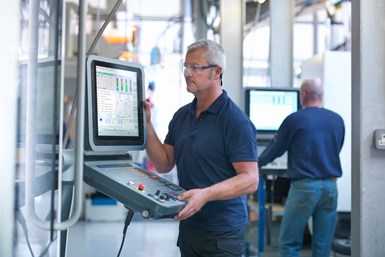Is Data Driving the Decisions You Make in Your Shop?
Collecting and using data enables shops to make more informed decisions on the shop floor as well as help automate processes. But don’t forget about the “data” stored in the minds of your top employees.
#Industry40 #columns

Is your shop collecting and using data from the shop floor to its advantage? Have you found ways to collect tribal knowledge from experienced employees? If so, and if you’d consider sharing your experiences with fellow Production Machining readers, shoot me an email at dkorn@productionmachining.com and perhaps we can chat about it.
It’s possible the September 2022 edition of Production Machining is a first for the brand: a true, special issue devoted to digital machining and manufacturing.
To help dispel the myth that today’s production shops are the grimy, oily screw machine operations of the past, the two Tech Briefs and three feature articles in this issue address some form of technology to facilitate the collection and use of shopfloor data that shops can apply to boost productivity and profitability.
Featured Content
For example, the Tech Briefs cover sensing technology for effective tool monitoring on rotary transfer machines as well as live-tooling units to optimize cutting conditions for those types of machine accessories.
The feature articles cover topics such as machine monitoring, adaptive machining, automated collection of part measurement data and enterprise resource planning (ERP) as a means to cull experienced employees’ tribal knowledge before they retire or move on to another company.
That last feature article I mention is something I’ve thought about for some time. If you haven’t already started to experience them, you soon will: those days when your most experienced baby boomer machinists retire, taking with them a wealth of captive knowledge amassed over years of diligent work on the shop floor. Quite often during shop visits I ask shops if that’s at top of mind and, if so, what is its plan for capturing that knowledge while it still can.
Implementing ERP software, as shops sometimes do in an effort to go paperless, offers a means to document some of it. For example, it enables you to permanently record notes they’ve scribbled on part prints that relay some tips to more effectively machine a tricky job, hints to simplify setups and so on. These systems also make it easy to share photos and video to communicate relevant job-related information.
But what about the more general type of shopfloor intel in your experienced machinists’ heads? How do you capture that?
They might be able to tell just by the sound an end mill makes that the cut data is off or perhaps that the tool is becoming dull. Or they might know a certain trick to more easily tram in a given machine. Or they might have learned there’s a certain sweet spot on a large machine where cutting is most accurate.
Your younger employees are starting to gather that type of knowledge, too. However, tapping into that knowledge can be even more difficult because they might be less inclined to share their know-how, feeling they’ll lose their competitive advantage over other employees. This means you have to make strides to establish a team-first work culture in which these employees understand that freely sharing information won’t come at a cost of diminished job security.
What I’m describing here mirrors the initial steps in establishing a smart manufacturing facility by implementing strategies such as Industry 4.0 and the Industrial Internet of Things. That is, you first must establish a mechanism of collecting information before you can analyze and apply it to improve your processes. Except in this case, we’re talking about collecting information from individuals, not things.
I’ve raised a lot of questions here, but I have one more: Would you share with me ways you are dealing with this issue of culling shopfloor knowledge from your employees? “Big data” initiatives rely on effective collection of relatively small bits of information. Similarly, the sum of these bits currently stored in the heads of many of your machining experts is likely quite significant after all. Email me.
RELATED CONTENT
-
Automation in High-Mix, Low-Volume Turning Applications
Turning shops are familiar with automation for high-volume work, but the shifting landscape to smaller batch sizes has created new challenges.
-
What Is The Best Bar Feed System For Production Turning?
Selecting the right bar feeder can be one of the most important decisions a shop can make. Bar feed systems help improve productivity, throughput and quality, but in order to achieve the most benefit from them it is essential that a bar feed system be matched to the particular needs of the turning operation.
-
Smart Workholding Device Measures and Monitors
Sensor and IIoT technology combine to enable these chucks and mandrels to automatically monitor workholding parameters and measure part features to ensure process stability.






